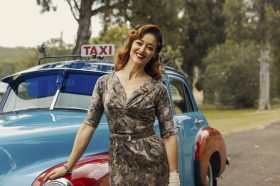Ron Woodroof, a Dallas electrician and rodeo habitué, is diagnosed with AIDS and advised to ‘get his affairs in order’ with only thirty days to live. Rejecting the conventional medical opinion of 1982 Texas, instead he researches and sources alternative medication not approved by the Food and Drug Administration, only available across the border or overseas. Finding it effective for himself, he begins smuggling it into the USA for sale to other HIV-AIDS patients through the legal loophole of a buyers’ club. Over the next several years, Woodroof’s actions bring him to loggerheads with the FDA who change their rules to make ‘non-approved’ medications ‘illegal’, and who alert the Internal Revenue Service to Woodroof’s unconventional business activities.
Matthew McConaughey’s portrayal of Woodroof is substantial, moving and wholly credible. McConaughey charts the character’s post-revelation journey of denial, anger and grief to hope, action and resilience; as well as an evolution in his attitude from homophobia to acceptance. As the film opens, we see a man only interested in his next line of coke and quick ‘n’ dirty screw; from this, Woodroof develops into a man who devotes all his energy travelling the world and battling bureaucracy to make effective medical care possible for those who need it. Admittedly, he is [also] in it for the money – he’s no saint. The viewer believes, though, that Woodroof-the-agitator is responsible for opening up and spotlighting early public discussion about HIV and AIDS.
While mostly shot in Louisiana, the film depicts the environment of early-Eighties Dallas as tough place to change the world: the ill-educated, homophobic machismo of rodeos and bars; the sterile inflexibility of the hospital where he’s diagnosed and written off, and the courtrooms where he argues his case, over and over; the concrete highways of a too-busy city; the trailer parks full of people whose only affordable reprieve from their lives is cheap booze or bad drugs. Woodroof seems at first very much a product of his environment, rendering his transformation and newfound purpose in life surprising – although perhaps not. While McConaughey avoids cliché, there is enough of the Texan cowboy maverick in Woodroof to make him seem capable of anything.
I was interested to learn that this film was twenty years in the making. Writer Craig Borten interviewed Ron Woodroof shortly before his death in 1992, going on to draft ten different scripts and approaching numerous directors and actors before Jean-Marc Vallée (director) and McConaughey signed up. I was also curious to read that while the film purports to be based on real life, it seems there is dissent among people who knew Woodroof about his sexuality, with most discarding the notion that he was anything other than a friend to the gay community. Having said that, it’s not hard to understand that a film might be seen to have more narrative impact where the lead character develops from bigot to ally in the fight against a disease which was seen as a ‘gay plague’.
Dallas Buyers Club’s archetypal narrative of ‘man fighting against the odds to succeed’ is admirably portrayed by a small, committed cast. Its direction achieves an intelligent balance of emotional and intellectual engagement with the viewer.
Rating: 4 stars out of 5
Dallas Buyers ClubDirector: Jean-Marc Vallée
USA, 2013, 116 minutes
Release date: 13 February
Distributor: Focus
Rated: MA
Actors:
Director:
Format:
Country:
Release:





